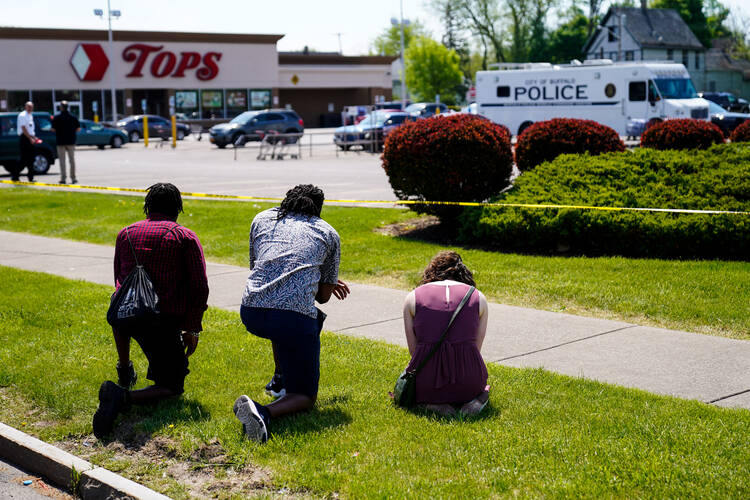Food is a basic necessity of life. It is our source of nourishment and a central point at the moments in which humanity thrives—family dinners and social gatherings, celebrations and moments of healing. And now, 10 people are dead because they went to get food at their local supermarket in Buffalo, N.Y. A community now lives in fear of conducting this modest, life-giving act. My home community in Western New York has joined the long list of American cities terrorized by a grotesque hatred.
It is evil for all of the obvious reasons: an 18-year-old white supremacist murdered Black men and women three and a half hours from his home due to some perceived existential threat. This is a sickness that runs deep. It is, in every sense, an outrage.
But how we as a society respond to these mass shootings is also outrageous. From Pittsburgh to San Bernardino, from El Paso to Sandy Hook, we mourn, but most of us do not act. Perhaps some have ceased to care; but I suspect most have simply lost hope that we have the power to prevent the next tragedy. We are conquered by death. For Christians, this is an unacceptable premise.
When it comes to gun violence, we have assumed that we are conquered by death. For Christians, this is an unacceptable premise.
The United States, like all societies, has never been free from hate. The reasons vary, but the results remain the same: We injure or kill those we deem as “other.” In recent years, a variety of factors have led to an increase of hate-driven acts with an ever-increasing body count. The combination of mental health crises, disinformation, economic challenges, collapsing civic institutions, decaying educational structures, a lack of community and access to deadly weapons are responsible for countless atrocities.
Our public policies can shape who has the power to inflict suffering and on whom they can inflict it with ease. In Buffalo, for example, the particular supermarket targeted by the white supremacist was the only market in what was otherwise a food desert, in a part of the city with a high concentration of Black residents—de facto segregation that is a byproduct of federal, state and city policies. For someone who is driven by a racist conspiracy theory, this is as opportune a target as it gets.
What is a Christian’s responsibility in the public sphere in addressing this human-made reality? Why do we perpetuate structures of a society that so clearly costs more of some than of others? And what about hate contained in hearts and minds, the fear driven by ever-deepening existential and spiritual crises?
Catholics have a framework for dealing with this, for opposing the sin of racism and working to build a society that addresses the fears that such sin preys upon. Both Catholic social teaching and our own lived tradition of opposing hate in our communities provide us with the what, how and why for living out the Gospel in contemporary society. We are required to pursue the common good so that individuals might be respected, that they might be empowered and that they might be able to better participate in society.
Catholics have a framework for opposing the sin of racism and working to build a society that addresses the fears that such sin preys upon.
Our prerogative as Catholics is not merely to oppose sin but to convert hearts. And that means both engaging in the public square to replace the rotten structures of our society, worn away by hate and greed, as well as meaningfully encountering individuals. This duty falls upon all Christians, but certainly more so on White Christians in the United States today. If our Black brothers and sisters are being abused and targeted by the evils in our society, are we not meant to stand alongside them and help them bear the cross—if not cast off certain crosses altogether?
These are questions we have to ask ourselves as White Catholics: How do we fight a culture of death? How do we hold accountable those in public life who sacrifice life in their lust for power? What does our tradition demand that we do?
Fighting a culture of death means that we advocate for positions that effectively support and promote human dignity, that encourage solidarity and implement subsidiarity. It means that we, on an individual basis, engage as if we actually understand the unique value ascribed to one another. It means that our public and personal personas are ever reconciling toward one another and adhering closer to the Gospel that celebrates life.
It means shaping our societies to reduce isolation and to render a greater sense of mutuality. It does not mean only combatting issues like euthanasia or capital punishment but pursuing our communal responses to injustice in a spirit of Christian charity. Catholic leaders cannot convince others that we believe in the equal dignity granted man and woman by God if we do not espouse viewpoints and policies that seek to allow individuals to flourish.
We can have reasonable and genuine disagreements on how to achieve Christian ends, but we have to agree on what those ends are. Fighting a culture of death, I would argue, requires working for ends like access to education, access to consistent work and criminal justice reform—and doing so in a manner that respects human dignity and subsidiarity. And this further requires engagement with those who represent us in public life.
We can have reasonable and genuine disagreements on how to achieve Christian ends, but we have to agree on what those ends are.
And how do we hold those in public life accountable? Increasingly many public figures in government and in the media have espoused ideas and theories that support white nationalism. Greed for power outweighs decency, with the best sound bite taking priority over morality or a commitment to the commonweal. How do we address them?
For Catholics, the answer is relatively simple: subsidiarity. We need to make decisions at the lowest competent level to empower people to engage in society. Coupled with our sense of justice and mercy, and remaining conscientious of the nature of our government, we have to show up and represent what we believe: that people matter. That the common good is more important than a political career. That we need to actively, thoughtfully and critically engage ideas in the public sphere in good faith and with honest debate. Accountability is a crucial component in achieving Christian ends in public life; Catholic leaders must employ our tradition, which continues to provide us with an understanding of what we should expect from those we entrust with our representation.
Both our theological and historical traditions demand a radical response rooted in the Gospel. This is not an uncomplicated history. In the American context, our church is opposed to white nationalism, to racism and to anti-Semitism. It has also enabled each of them in particular times and places. We have the likes of Msgr. James Kirwin, who opposed the Ku Klux Klan in Galveston, Tex., in the early 20th century; and then we have that of Father Charles Coughlin, who spewed anti-Semitism on the airwaves just a few decades later.
It is a tradition operating in a fallen world—no purely human initiative will prove perfect in the end—but there is a clear right and a clear wrong.We have to decide what we are compelled to do by what is right. We cannot shirk our duty if we truly believe what we profess, and we should be both affirmed and challenged by the actions of our predecessors in living out our faith.
Now we have to figure out how to live with and act on our outrage. We owe more to one another than simple mourning. We owe it to one another to fight for the Gospel. We owe it to one another to gather and nourish our communities in peace. This is literally the sacramental life of the church; consuming the body and blood of Christ is the spiritual and physical nourishment that enables us to nourish others. Our partaking in the sacramental mysteries of the Eucharist is not a static relationship, nor even a solely personal one; our reception of Christ requires us to conform ourselves to the Gospel, which can only be done in relationship to one another. The final question we ought to ask is: Who is Christ calling us to be in this moment?








